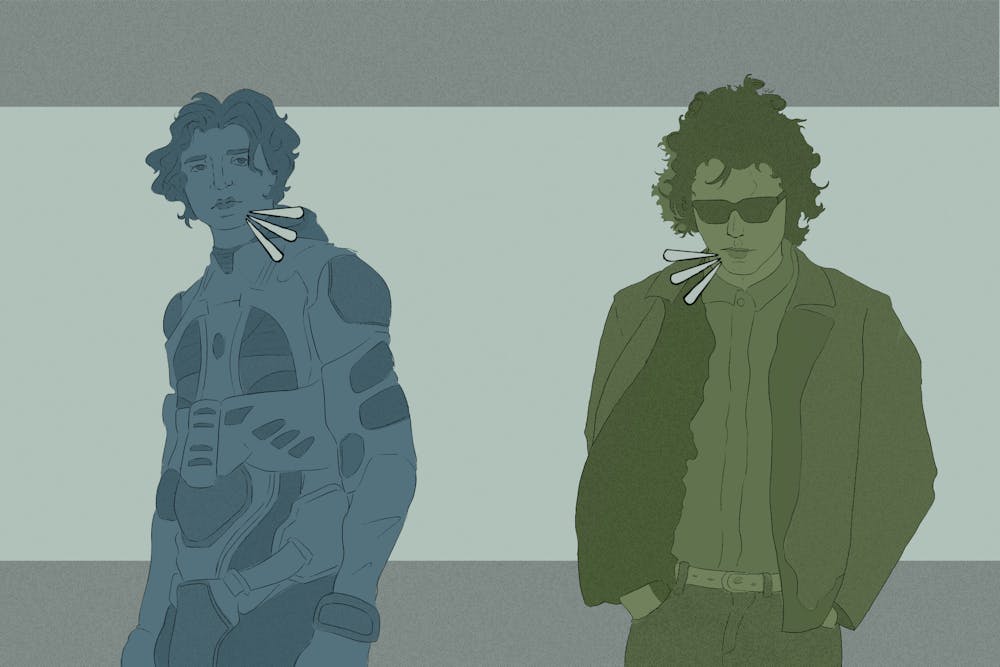It's not cool to care anymore.
When Timothée Chalamet accepted the SAG's Best Actor in a Leading Role award, his speech stood head and shoulders above the rest of award season (cough cough, Adrien Brody).
"I know the classiest thing would be to downplay the effort that went into this role and how much this means to me," Chalamet said, speaking on his role as Bob Dylan in the award-winning biopic "A Complete Unknown." "I know we're in a subjective business, but the truth is, I'm really in pursuit of greatness. I know people don't usually talk like that, but I want to be one of the greats."
Although the speech was more akin to an athlete's rather than an actor's, it's never been more fitting to have such an honest moment broadcasted on the big stage. As we approach the back half of the 2020s, Chalamet's unprecedented, authentic passion hopefully signals an end to a much larger, more worrying societal trend: nonchalance.
Although the cool and unbothered character archetype has been in the media for a long time, the nonchalant epidemic (trademark pending) has spread like wildfire over the past few years. It's not without its reasons. It's human nature to fetishize the mysterious. We're drawn toward the (complete) unknown, so we don this mask of nonchalance in an effort to attract others to us.
TikTok and YouTube alpha male influencers peddle nonchalance as a way to court and hold power over women. Some NBA players (looking at you, Shai Gilgeous-Alexander) lean into the nonchalant image to add some "aura" to their brand. In Chalamet's field, actors take on nonchalance to avoid getting hit by allegations of being overly ambitious.
But that's where the problem arises. When, and more importantly why, did we decide that being ambitious is a bad thing? Nonchalance has enabled casual apathy to run amok in our lives. By not trying, we implicitly doubt ourselves, losing our passion as a result.
Not one person who made a sizable dent in society got where they did without having a shred of passion. Downplaying who you are, becoming this shell of a person for the purpose of conformity strips us of all of our wonderful little nuances and traits that make us, well, us.
We're drawn toward the exceptional, the unique and the authentic. But, I get it, it's incredibly hard to put yourself out there. With social media, what I put out into the internet is open to far more people than I could imagine. It can be — scratch that — it is daunting. As we grow increasingly connected in the digital sphere, these worries (and the appeal of nonchalance and conformity) rise in kind.
There is latent cringiness in trying to seem dark and mysterious to attract women or to get some validation on Instagram. Let's set aside the contradiction that trying to be nonchalant is, more or less, the least nonchalant thing you can do. The most dangerous aspect of nonchalance is that it encourages repression.
Nonchalance has become a defense mechanism people can employ to push down their emotions. Don't want to open up and get vulnerable? Play the nonchalant role and lie to yourself. Sure, you'll get some aura points by seeming unaffected, but it's a pretty lonely route that nobody's forcing you to take.
Every day, ordinary people are confronting their fears and doing justice for those suffering in silence. Advocating for the nonchalant approach to suppress how you're feeling is incredibly counterproductive.
Granted, nonchalance has some virtues. It's great to be unbothered by the noise of the world. Accepting the bad things for what they are and letting them pass you by is a healthy process when dealing with grief. But this nonchalance gimmick, this facade of unaffectedness, doesn’t promote that. Remember, you aren't actually unbothered — you're just pretending to be. Those feelings can only lay dormant for so long.
READ MORE: State of the Oscars: The State Press' resident film buffs predict 2025 Academy Award winners
Although Chalamet didn't get that elusive Oscar, he did something much greater in his pursuit of being "one of the greats." Reminding us that it's okay to care and want to be something better than our current selves is a much needed push whenever we're feeling down.
As far as we know, we only get one shot on this world. Stop passively accumulating experiences and start actively living instead. Start dreaming. Start chalanting.
Editor's note: The opinions presented in this column are the author's and do not imply any endorsement from The State Press or its editors.
Edited by Andrew Dirst, Sophia Ramirez and Katrina Michalak.
Reach the reporter at stroeste@asu.edu and follow @samtroester on X.
Like The State Press on Facebook and follow @statepress on X.
Sam is a sophomore studying political science with a minor in business. This is his first semester with The State Press.




